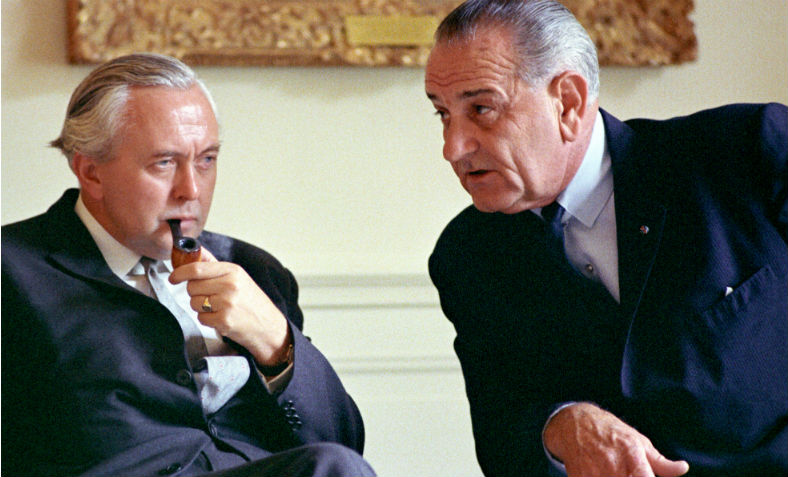 Lyndon B. Johnson meets with Prime Minister Harold Wilson
Lyndon B. Johnson meets with Prime Minister Harold Wilson
Recent attacks on Corbyn are part of the British state’s long history of undemining the left, writes Chris Nineham
Civil servants have been briefing the press that Corbyn is too ‘frail’ to govern. A former head of MI6 briefed of concerns that Corbyn ‘does not have the standing’ to be prime minister. Even US Secretary of State Mike Pompeo was leaked talking of a ‘push back’ against Corbyn, implying moves against him before he could get elected.
Should we be concerned about these incidents? Yes. Firstly, they are part of a pattern. Soon after Corbyn was elected leader a general warned of high level mutiny if Corbyn became Prime Minister. A little later it emerged MI6 officials were refusing to meet Corbyn because he was ‘untrustworthy’. Since then of course the media have relentlessly attacked him and his supporters, with insiders revealing concerted efforts to portray him as unelectable. The BBC has been particularly prominent in giving airtime to those from the Labour right who have attacked and smeared him.
More generally it would be wrong to be naïve about the role of the British state. There has in fact been a long history of the British state and media using dirty tricks to subvert Labour governments. Labour’s very first government collapsed in 1924 in the face of demands to prosecute the editor of a communist newspaper. Four days before the election that followed the Daily Mail published a forged letter claiming to be from the Comintern president Zinoviev. It was addressed to the British Communist Party, but it suggested links between Russia and a Labour government would help with the spread of Leninist ideas. The ‘Zinoviev letter’ scare dominated the last days of the election and helped ensure a Tory victory.
The post-war Attlee government had huge support for its nationalisation and welfare programme. But there were strict limits to how far it was allowed to go. Any suggestion of democratising newly nationalised industries was blocked. There was an establishmentwide and successful campaign to stop the nationalisation of iron and steel and sugar production because they were profitable industries. Big business and civil servants alike boycotted development councils that were supposed to allow government some role in co-ordinating industry.
The Wilson Labour government of 1974-76 faced more state obstruction than any other. Wilson was elected on the back of a strike wave and Labour won on its most left wing manifesto ever. It promised a ‘fundamental and irreversible shift in the balance of power in favour of working people and their families’. A range of official institutions moved against it in the months that followed. Key civil servants refused to co-operate. Minister of Industry Tony Benn wrote that his top official regularly blocked policy and treated him ‘like a consultant psychiatrist would a particularly dangerous patient’.
Backed by the IMF, bankers threatened and orchestrated runs on the pound. Meanwhile, MI5 worked to smear members of the government, including Prime Minister Harold Wilson. Former MI5 officer Peter Wright claimed the organisation ‘would arrange for selective details of the intelligence about leading Labour Party figures, especially Wilson, to be leaked to sympathetic pressmen’. The security services were working with a range of extra-parliamentary organisations that had set themselves up to take control of the country in the event of government collapse.
All this helped to destabilise the government, but the attacks were aimed in particular at destroying the Left. Left wing Overseas Development Minister Judith Hart was removed from the cabinet by Harold Wilson on the basis of false claims from the security services that she had communist links. After an intense campaign of slander and non-cooperation, Benn was demoted from his cabinet position in 1975 by Harold Wilson. The move was later shown to have been demanded by big business.
By 1976, the left in the Party was in disarray and the new leader Jim Callaghan could lead the turn towards tight money and spending cuts that laid the basis for the neoliberal policies that followed.
The recent incidents are not the result of rogue elements in the state. Its institutions have always worked hard to subvert or tame Labour governments. As the Financial Times has repeatedly made clear, the British establishment fears a Corbyn government more than Brexit. They are intent on destroying the whole Corbyn project. It will need the widest mobilisation of the whole movement to stop them.

